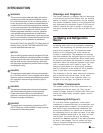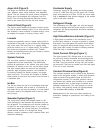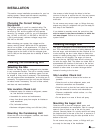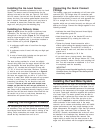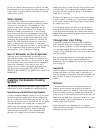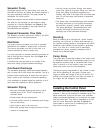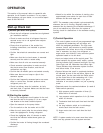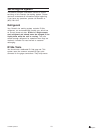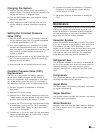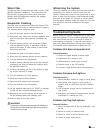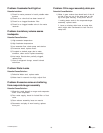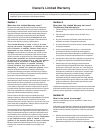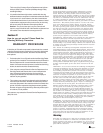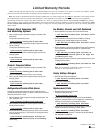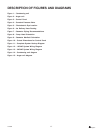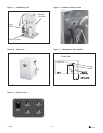
11
YY
YY
Y
English
L-2448B Operation
Charging the System
1) Remove line from vacuum pump, and connect to a
bottle of R134a. The charge should be weighted in by
placing the bottle on a refrigerant scale.
2) Turn the bottle upside down, and purge the charge
hose at the gage set.
3) Allow refrigerant to flow in the high side until the
correct charge is reached. Disconnect refrigerant
tank.
Setting the Constant Pressure
Valve (CPV)
1) Start the system and run for 15 minutes. Observe
the low pressure gage. The CPV should be adjusted
to maintain approximately 9-10 PSI.
2) Turn valve adjustment knob clockwise (in) to raise
pressure and counterclockwise (out) to lower pres-
sure. Only make ¼ turn adjustments at the time, and
allow three (3) minutes between adjustments for
system to equalize.
3) Make sure that the valve is dry, and replace the cap
on CPV, being careful not to disturb the setting by
gripping the cap too tightly.
4) Remove gage set and replace service port caps.
Constant Pressure Valve (CPV)
Replacement
The CPV is a very simple and durable metering
device. Often small blockages can be cleared by
turning the adjustment knob completely in, then back
out. In the unlikely event that the CPV is blocked or
the diaphragm ruptured, it can be replaced as follows:
1) Recover refrigerant as described in “Evacuate
Refrigerant.”
2) Remove CPV from the auger.
3) Remove the ¼" liquid line by loosening the flare nut.
Thread sealant has been applied to the flare threads,
so some extra force may be required to loosen.
4) Connect the CPV to the auger. We recommend using
a threadlocker, such as LocTite 545 or equivalent,
on the threads ONLY. Tighten as you would a flare
fitting. Do not overtighten.
5) Connect the ¼" line to the new CPV. We recommend
using a threadlocker, such as LocTite 545 or equiva-
lent, on the threads ONLY.
6) Evacuate the system as described in “Evacuate
Refrigerant, and recharge the system with the
correct amount of R134a.
7) Set suction pressure as described in “Setting the
CPV.”
Maintenance
The periods and procedures given for maintenance and
cleaning are guides only and should not to be con-
strued as absolute or invariable. Cleaning especially
will vary, depending on local water conditions (hard
water, etc) and the ice volume produced.
Seawater System
Check the seawater strainer daily. Remove any debris.
If you are in waters where jellyfish or other debris is a
real problem, you may find it necessary to add a
strainer on the outside of the thru-hull fitting. Verify that
all water connections are tight, and check for water
flow from the overboard discharge. The centrifugal
pump does not need any routine maintenance.
Refrigerant Gas
The refrigerant included in the system is adequate for
the life of the system, and should not need routine or
seasonal charging. If the need exists for routine
charging, then look for a refrigerant leak that needs
repair.
Compressor
The compressor has no user serviceable parts, and is
lubricated constantly during operation.
Auger Motor
The auger motor is permanently lubricated, and needs
no regular maintenance.
Auger Gearbox
The gearbox comes pre-filled with lubricant, and should
not need regular maintenance.
Water Reservoir
Quarterly clean and flush the water reservoir. Depress
the float to ensure that a full stream of water enters
the reservoir.



